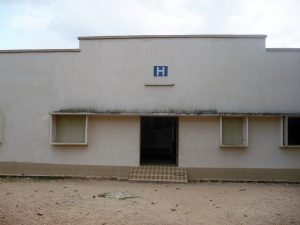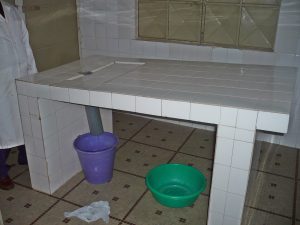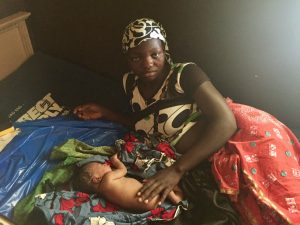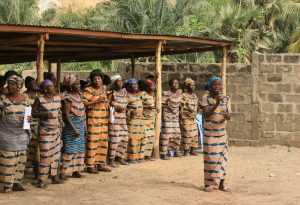This project is made possible through the partnership of WATER CHARITY and the NATIONAL PEACE CORPS ASSOCIATION. ![]()
This project has been completed. To read about the conclusion, CLICK HERE.
Location
Village of Djamde, Kozah District, Kara Region, Togo
Community Description
In Togo, 368 mothers die for every 100,000 live births and roughly 1 in 10 children born will die before their 5th birthday, an astounding 15 times the child mortality rate of developed countries. The majority of these deaths are caused by easily preventable conditions that could be treated at very low costs. Furthermore, the majority of these deaths happen in the neglected, northern region of Togo, in villages like Djamde.
 Thirty kilometers west of the city of Kara, Djamde is a large village at the foot of mountains. The vast majority of the 5,340 inhabitants are subsistence farmers belonging to the Kabiyè ethnic group. Due to a myriad of factors, the population of Djamde rarely frequented the health center prior to the support of Hope Through Health (HTH). In July 2015, the Djamde Health Center reported a 37% coverage rate and less than 10 facility-based deliveries per month.
Thirty kilometers west of the city of Kara, Djamde is a large village at the foot of mountains. The vast majority of the 5,340 inhabitants are subsistence farmers belonging to the Kabiyè ethnic group. Due to a myriad of factors, the population of Djamde rarely frequented the health center prior to the support of Hope Through Health (HTH). In July 2015, the Djamde Health Center reported a 37% coverage rate and less than 10 facility-based deliveries per month.
Problem Addressed
HTH works to eliminate barriers to good health by eliminating user fees for patients, deploying Community Health Workers, mentoring nurses and midwives in public clinics, and improving supply chains in nine communities across northern Togo, including Djamde. They have been able to make excellent strides toward reducing mortality and morbidity in Djamde, but the state of the health center remains a limiting factor.
The Djamde Health Center is in need of extensive repairs and renovations, including improved water source and plumbing. The center provides lifesaving care to a population of 5,340, all without running water. While the clinic has plumbing, this system has fallen into disrepair and needs to be restored. Staff members harvest rainwater from the roof during the rainy season or water is carried from an alternative source in the community.
 Without proper plumbing and electric systems, the center is ill-equipped to provide high-quality healthcare services to meet the needs of the surrounding communities.
Without proper plumbing and electric systems, the center is ill-equipped to provide high-quality healthcare services to meet the needs of the surrounding communities.
Project Description
A borehole will be drilled to a depth of 70-100 meters. The existing concrete tank will be replaced by a poly tank, and new piping installed. Faulty supply piping to the washbasin taps inside the building will be replaced.
Hope Through Health, in partnership Construction for Change (CFC) and the 30/30 Project, will renovate the Djamde Health Center so that the quality of the building matches the excellent services being delivered inside its walls. This will include a new water system, as outlined below.
The Djamde clinic has an existing plumbing system. However, the current water tower/tank on the property is not functional. The system will be modified to include a borehole with a 2kfa hydraulic pump, a 3,000-liter water storage poly tank, and improvements to the existing concrete water tower.
Project Managers from CFC who are based in Togo will oversee this project. They have already performed site assessments and have a detailed outline of how to accomplish each of these tasks. They will hire a Togolese construction company to complete the work.
 The construction company will hire some members of the community as laborers for the duration of the project. All major decisions on renovations will be made in collaboration with the Togolese Ministry of health.
The construction company will hire some members of the community as laborers for the duration of the project. All major decisions on renovations will be made in collaboration with the Togolese Ministry of health.
Funds from Water Charity will go specifically to labor and materials costs associated with improving the water supply at the health center.
Project Impact
5,340 people will benefit from the project.
Returned Peace Corps Volunteer Directing Project
Jennifer Schechter, RPCV and Executive Director Hope Through Health.
Monitoring and Maintenance
CFC Program Managers will oversee the project’s progress until completion. Thereafter, HTH will monitor the functioning of the clinic and assure that all technology is running smoothly. HTH’s Clinical Mentor will visit the Djamde Health Center two times a month for ongoing coaching; during these visits, he will be able to take note of any issues.
In addition, HTH will collect service indicators from the center each month, including the number of children under five treated, the number of facility-based deliveries, and the number of women who adopt family planning methods. Monitoring these indicators will also help HTH see how the renovation project is contributing to the health of the community.
Renovating the Djamde Health Center is a sustainable project because it is a top-off investment to what the Ministry of Health (MOH) is already investing in the center. The MOH pays the salaries of staff for the clinic as well as other ongoing costs such as utilities. With the renovated clinic, HTH expects coverage rates to increase, meaning that the MOH is able to reach more patients with their current investment. Strengthening the existing health center with a goal of government adoption makes the impact sustainable over the long term.
This project has been funded by an anonymous donor.
Conclusion of Djamde Health Center Water Project – Togo
This project has been completed under the direction of Returned Peace Corps Volunteer Jennifer Schechter. To read about the start of the project, CLICK HERE.
 The project was designed to drill a borehole, replace the water tank, and replace piping.
The project was designed to drill a borehole, replace the water tank, and replace piping.
Jennifer reports:
Scope of the project
The goal of the Djamde Clinic Renovation project was to improve the public health center in the underserved village of Djamde in northern Togo so that it could meet the needs of the community and ensure high-quality healthcare for all. This renovation project was designed to complement and support Hope Through Health’s work to make high-quality healthcare accessible to this community, by integrating Community Health Workers with improved public clinics.In order to achieve the overall goal of ensuring the quality of the building matches the excellent services being delivered inside its walls, the primary objective was to establish an improved water source at the clinic, including the drilling of a well, and installation of a hydraulic pump, water tower, and storage tank. Previously, clinic staff members collected rainwater, and patients carried water from a community pump.
In addition, other renovations were planned to fix longstanding problems:
Improve the existing, unusable latrines to be clean and functioning toilets with running water
Repair roofing to prevent leaks and molding inside the clinic
Replace water-damaged drop-ceiling
Remove mold, repaint the walls, and tile the floors and lower walls
Replace metal doors and windows and install mosquito screens
Build a fenced enclosure for the existing medical waste incinerator
Repair faulty electrical wiring and equipment to ensure sufficient lighting
Process
The first step of the renovation project was to conduct a site assessment in January 2016 to determine the most needed improvements and outline how best to address these priority issues. Hope Through Health (HTH) partnered with Construction For Change (CFC) on the Sarakawa, Kpindi, and Djamde Clinic Renovation projects. CFC project managers arrived on site in August 2017. HTH program team members and CFC project managers worked together to create a prioritized list of improvements based on their anticipated impact and cost. The provision of an improved water source was at the top of the list.In September 2017, CFC project managers evaluated seven different local construction teams based on their quality of work and capacity to complete the project within the desired timeframe and price. Expertise in water drilling and pumping in the local context was a major factor in selecting a partner.
Following conversations with the clinic staff about minimizing disruption to the clinic, it was decided not to stage the renovation room by room but rather to finish the most disruptive interior work all at once and as quickly as possible. Timeliness was therefore a particularly important criterion for the local construction team. The project managers hired an excellent team, L’eau Pour Le Togo (Water for Togo), which was able to complete the work, under their supervision, ahead of schedule and under budget. HTH was therefore able to add a couple of items from the wish-list of improvements, including the construction of a shaded outdoor area for community health talks and for spillover waiting space during crowded mass vaccination days.
In October and November 2017, the construction team worked simultaneously at the three clinic sites in Sarakawa, Djamde, and Kpindi. Within each site, they were divided into small sub-teams that focused on the plumbing, roofing, and interior improvements, so that the entire process was completed in a choreographed flurry.
The construction team was met with some challenges regarding water source at Djamde. Initially, the team had assumed that the well would be approximately 70 meters deep, but the CFC project managers and L’eau Pour Le Togo discovered that they needed to drill 130 meters through a hard layer of rock to get safe, naturally filtered, potable water.
The water was tested for metal and chemical contaminants and was found to be clean enough that no further filtering was needed. We had also planned to refurbish an existing water tower, but CFC and L’eau Pour Le Togo realized that they would be best able to drill for water on the opposite side of the clinic property. Furthermore, there were concerns about the amount of strengthening needed to ensure that the existing tower would be able to support the new water storage tank. In the end, the construction managers decided to build an entirely new water tower.
In addition, CFC project managers discovered that the roof required more extensive restructuring for water management than had been initially expected. The construction team added metal roof paneling to extend beyond the existing roof gutter, directing water completely off the roof and building onto the ground. This system will ensure that water does not sit on top of the flat concrete roof, preventing deep cracks, leaks, and mold.
After the completion of the renovation project in December 2017, CFC project managers toured the site with the Kozah District Health Director, who was delighted to see the improvements. He called on the clinic staff to respect their workplace by cleaning as necessary and welcoming new patients warmly. The HTH Clinical Mentor continues to visit Djamde two or three times every month to provide guidance, monitor for quality, and ensure that the clinic is in good condition.
End result
By December 2017, all project objectives had been met. Most notably, a new hydraulic pump was installed as well as a seven-meter water tower and holding polytank. Plumbing was officially installed in the clinic as well as outdoor latrines. In addition to this primary objective, all other goals were met:Renovated latrines with “Western” and “Turkish” toilets and running water
New roof structure to prevent water leaks and improve water management
Ceiling and walls replaced
Mold removed and walls, floors, and ceilings repainted or tiled
New doors and new glass windows with mosquito screens
Fencing structure for incinerator Improved electrical wiring in the clinicSome additional renovations were accomplished as well:
New electric refrigerator for storing vaccines and other medicines
New shaded outdoor seating structure for community gatherings with electrical outlets
New shaded garage structure for rural ambulanceCommunity Involvement
The Djamde Clinic Renovation project was designed with local capacity-building in mind. The local construction team selected was chosen largely for its expertise in installing wells. Because they are based in the region, they will be available to repair the wells if needed and can teach members of the community about maintenance and repair of the wells. As many skills as the construction team brought to the project, they were also eager to learn about construction best practices from the CFC project managers. In particular, the CFC project managers shared techniques for designing the roof and water management systems to prevent leaking, cracking, and earth erosion around the building.At a community meeting in Djamde to present the results of HTH’s work over the past six months, the community was effusive in their gratitude for the clinic renovations and particularly the provision of water. The Djamde Women’s Committee composed a song about the improvements to the clinic, and hundreds of community members cheered on a skit about the impact of having running water in the clinic for pregnant women. The skit concluded with a pregnant woman who had struggled to bring potable water to her previous appointment exclaiming with joy: “I’m going to tell all my women friends that now we have water at the clinic. We have everything at the clinic now! Now, we are free to get pregnant without any concerns!”
A HTH Community Health Worker had a similar reaction to the clinic renovations:
“The clinic is so beautiful and clean now, patients are so much happier spending time there. Having electricity all the time is really good, especially at night. The center feels much safer now. With the mosquito nets they installed, it’s more comfortable for the patients.”
Conclusion
HTH is incredibly grateful for the partnership of Water Charity in our efforts to ensure high-quality healthcare for all, starting in northern Togo. Thanks to your support, the Djamde Clinic has been transformed into a clean and safe space where the community can receive care with dignity.
We are grateful to Jennifer for completing this important project.